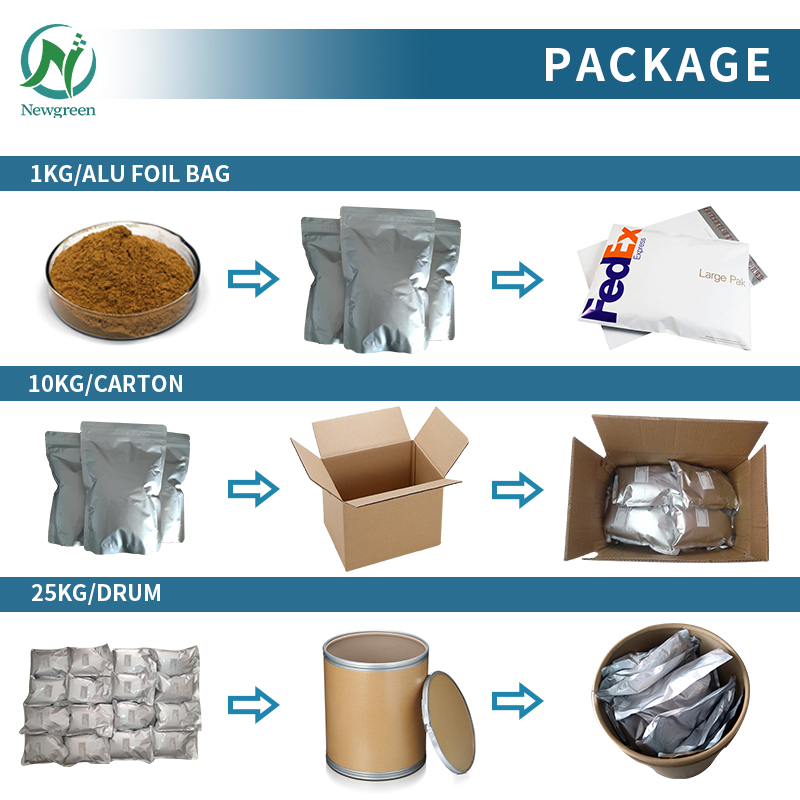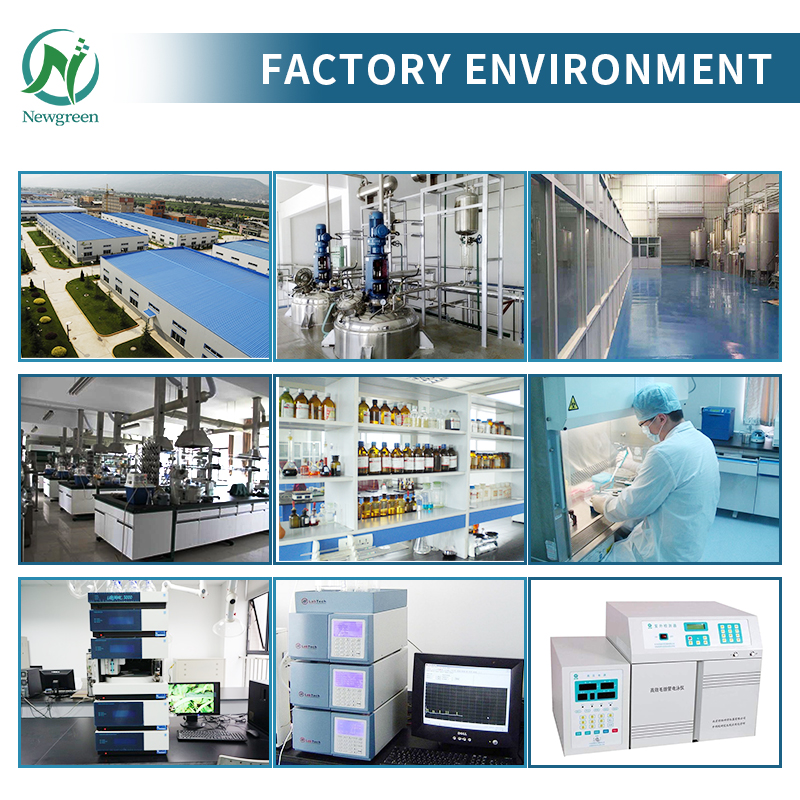Newgreen Supply High QualityBrown Algae Extract 98% Fucoidan Powder

Product Description:
Fucoidan, known as fucoidan, fucoidan sulfate, fucoidan gum, fucoidan sulfate, etc., mainly from brown algae, is a kind of polysaccharide containing fucose and sulfuric acid groups. It has a variety of biological functions, such as anti-coagulation, anti-tumor, anti-thrombus, anti-virus, anti-oxidation and enhance the body's immune function, so it is widely used in the field of medicine and modern food industry.
COA:
|
Product Name: |
Fucoidan |
Test Date: |
2024-07-19 |
|
Batch No.: |
NG24071801 |
Manufacture Date: |
2024-07-18 |
|
Quantity: |
450kg |
Expiration Date: |
2026-07-17 |
| ITEMS | STANDARD | RESULTS |
| Appearance | White Powder | Conform |
| Odor | Characteristic | Conform |
| Taste | Characteristic | Conform |
| Assay | ≥98.0% | 98.4% |
| Ash Content | ≤0.2% | 0.15% |
| Heavy Metals | ≤10ppm | Conform |
| As | ≤0.2ppm | <0.2 ppm |
| Pb | ≤0.2ppm | <0.2 ppm |
| Cd | ≤0.1ppm | <0.1 ppm |
| Hg | ≤0.1ppm | <0.1 ppm |
| Total Plate Count | ≤1,000 CFU/g | <150 CFU/g |
| Mold & Yeast | ≤50 CFU/g | <10 CFU/g |
| E. Coll | ≤10 MPN/g | <10 MPN/g |
| Salmonella | Negative | Not Detected |
| Staphylococcus Aureus | Negative | Not Detected |
| Conclusion | Conform to the specification of the requirement. | |
| Storage | Store in a cool, dry and ventilated place place. | |
| Shelf Life | Two years if sealed and store away from direct sun light and moisture. | |
Function:
1. Improves stomach disease
It was found that the effect of the polysaccharide on gastric diseases was mainly manifested in the following three aspects: (1) The polysaccharide had the effect of removing Helicobacter pylori, inhibiting the proliferation of Helicobacter pylori and inhibiting its binding with gastric mucosa; (2) It has the effect of protecting gastric mucosa and treating gastric ulcer, and has a good alleviating effect on alcohol and drug-induced gastric mucosal injury and chronic gastric ulcer; (3) Fucoidan has anti-gastric cancer effect, can inhibit the proliferation of gastric cancer cells, alleviate the side effects of chemotherapy, and improve the quality of life of patients.
2. Anticoagulant effect
Fucoidan has many biological functions, but its anticoagulant activity is the most widely studied. Studies have shown that the polysaccharides extracted from different Marine brown algae have different degrees of anticoagulant activity. For example, the polysaccharides from and showed a high degree of anticoagulant activity, and the anticoagulant activity of and was half that of the former, but almost no anticoagulant activity.
3. Antithrombotic effect
In the experimental model of living animals, the polysaccharide of fucoidan has inhibitory effect on both venous thrombosis and arterial thrombosis. Rocha et al. found that the polysaccharide had no anticoagulant activity in vitro, but showed obvious antithrombotic effect in the animal model of forming venous thrombosis, and the effect was time-dependent, reaching the maximum after 8h of administration. The anticoagulant activity of the polysaccharide was probably related to stimulating the production of heparin sulfate by endothelial cells.
4. Antiviral effect
Studies have shown that sulfated polysaccharides (including fucoidan polysaccharides) exhibit antiviral activity both in vivo and in vitro. Hayashi et al. studied the defense effect of fucoidan on herpes simplex virus (HSV). They found that fucoidan can protect mice from HSV infection, and pointed out that fucoidan may prevent HSV infection by directly inhibiting virus replication and enhancing innate and acquired immune defense function. At the same time, it was also found that the polysaccharide showed antiviral activity against HSV-1 and HSV-2. Hidari et al. reported that fucoidan can effectively inhibit the infection of dengue virus type 2 (DEN2), and showed that fucoidan binds to DEN2 particles and interacts with its packaging glycoprotein. It has no direct passivation effect on virions, and its antiviral mechanism is to inhibit the formation of virus cytiocytes by inhibiting the adsorption of virus.
5. Anti-tumor effect
Fucoidan is regarded as a natural anti-cancer agent, and its anti-tumor activity has been reported more and more. Alekseyenko et al. studied the anti-tumor activity of fucoidan on mice suffering from Lewis lung adenocarcinoma, and fed fucoidan at a dose of 10mg/kg to mice, resulting in moderate anti-tumor activity and anti-tumor metastasis effect. Some studies also found that the tumor inhibition rate of fucoidan on 5 animals containing S180 sarcoma was 30%, and the sarcoma of 2 animals completely subsided. In a petri dish of about 10,000 colon cancer cells treated with natural algae polysaccharides obtained from kelp, 50 percent of the cancer cells died after 24 hours, and almost all of the cancer cells died after 72 hours. Hyun et al. found that the polysaccharide of rock algae can significantly inhibit the growth of HCT-15 colon cancer cells. After treatment of HCT-15 cell line with rock algae polysaccharide, apoptotic events such as DNA breakage, chromosome aggregation, and the increase of subdiploid cells in G1 phase appeared
6. Antioxidant effects
A large number of in vitro experiments have shown that the polysaccharide of rock algae has significant antioxidant activity, it is a kind of natural antioxidant, and can effectively prevent the disease caused by free radicals. Costa et al. extracted sulfated polysaccharides from 11 species of tropical seaweed, all of which had antioxidant activity, ability to form ferrous chelates and reducing power, 5 of which had the ability to remove hydroxyl radicals, and 6 of which had the ability to remove peroxy radicals. Micheline et al. reported that polysaccharides from algae can inhibit the formation of hydroxyl radical and superoxide radical.
7. Immune activity
Fucoidan has many immune activities, including anti-complement activity, anti-inflammatory response and immunomodulatory effects. Tissot et al. confirmed that the polysaccharide of fucoite can inhibit the complement protein in normal human serum, thus inhibiting the dissolution of sheep red blood cells caused by the activation of complement, and inhibiting the activation of complement by inhibiting the first step of the classical activation pathway (including the first component of complement, the second component and the fourth component). Yang et al. found that fucoidan can selectively inhibit the expression of inducible nitric oxide synthase in inflammatory cells and has anti-inflammatory activity. Mizuno et al. used the co-culture system of intestinal epithelial Caco-2 cells and macrophage RAW264.7 to evaluate the anti-inflammatory effect of food factors, and the results showed that the polysaccharide of S. japonicum can stimulate the production of tumor necrosis factor α in RAW264.7, thereby inhibiting the mRNA expression of interleukin in Caco-2 cells.
8. Improve sperm quality
The administration of fucoidan can improve sperm quality and quantity by improving blood metabolites and intestinal microbiota. The researchers found that after being administered with seaweed polysaccharides, the expression levels of genes associated with spermatogenesis were significantly increased in the testes of mice. At the same time, there was a good correlation between intestinal microbiota and blood metabolites. By regulating the two, the polysaccharide of fucoite improved the metabolites of testis, increased antioxidant protection, and up-regulated the expression level of related genes in germ cells, thus contributing to spermatogenesis and quality improvement.
Application:
Fucoidan is widely used in many fields, mainly including the following aspects:
1. Medical field: Fucoidan is used in some drugs, especially in some immunomodulatory and antioxidant drugs, to help improve chronic diseases and promote recovery.
2. Food industry: Fucoidan is often used as a food additive to increase the nutritional value and functionality of food. It can be used in various foods, such as ice cream, beverages, bread, etc.
3. Cosmetics and skin care products: Due to its antioxidant and moisturizing properties, fucoidan is widely used in skin care products and cosmetics, helping to improve skin texture and reduce the appearance of fine lines and wrinkles.
4. Medical devices: Fucoidan is also used in some medical devices and medical materials to promote wound healing and reduce infection.
Overall, fucoidan is widely used in medicine, food, cosmetics, and medical devices due to its multiple benefits and functions.
Package & Delivery



















